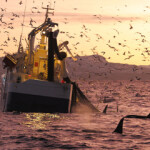"This is not a radical, extremist agenda” – Seafood market players sign on for more RFMO transparency
Sponsored

Regional fisheries management organizations (RFMOs) are poised to take on larger roles in ocean governance moving forward, making it all the more imperative that the system’s culture of secrecy is dismantled and replaced with one of openness and accountability, according to ocean governance transparency advocacy group Accountability.Fish.
“For the most part, the world’s RFMOs operate with an unacceptable level of secrecy, creating a black hole around the sustainable management of fish stocks and the related monitoring of the sustainability of the world’s ocean ecosystems,” Accountability.Fish Global Director Ryan Orgera told SeafoodSource.
As “bodies that have opted for secrecy, or at least collegiality, in the way they've operated since their inception,” RFMOs have skewed the international fisheries decision-making process to favor industrial interests at the expense of numerous other ocean and seafood stakeholders, per Accountability.Fish Communication Lead Mike Klein, who travelled last year to the compliance meeting of the world’s most powerful Tuna RFMO, the Western and Central Pacific Fisheries Commission (WCPFC), only to be blocked from attending three days of closed sessions.
Consumers, retailers, conservationists, the media, and other observers are often relegated to waiting in the wings during key RFMO meetings, Klein added, and even those who do make it through the door experience pressure to keep quiet.
“It’s like people are invited to the hallway, but they’re not allowed into the room. Or if they manage to get an invite into the room, they’re strongly discouraged from reporting out on what exactly goes on there,” Klein said.
Accoutability.Fish has scored some notable success in the area of RFMO reporting though the publication of its RFMO AccountabilityTracker, which is based on confidential but corroborated reports from observers attending the parts of RFMO meeting that are open to them and where actions are ratified or torpedoed by their member countries.
But the lack of access of market players, civil society groups and other NGOs to RFMO discussions makes their involvement in larger ocean issues questionable and potentially dangerous. “In light of recent international policy developments – particularly with the United Nations Biodiversity of Areas Beyond National Jurisdiction (BBNJ) Treaty – this air of exclusivity stands to intensify if the RFMO processes continues to go unchecked and unchallenged,” Orgera, a global marine policy expert who leads the Accountability.Fish effort, warned.
“What is the role for the RFMOs in this emerging new picture of biodiversity governance in the oceans? That’s the big question,” Orgera said. “We already see that the current organization of the RFMOs does not sufficiently involve the various stakeholders and their interests in decision-making, such as those of the market or the NGOs. With the BBNJ Treaty, in which the RFMOs will play a pivotal participatory role, these shortcomings will become even more pressing. Considerations of control and accountability make greater transparency and involvement in RFMOs absolutely necessary.”
With the ambition of several key states to get sufficient ratifications to activate the BBNJ Treaty in 2025, “we should get this RFMO situation sorted out now before it becomes harder to untangle,” Orgera noted.
To demonstrate broad support for open RFMO governance, Accountability.Fish has launched a campaign for a set of Equal Access Principles to be instituted across RFMOs to ensure a more level playing field for all ocean stakeholders.
Endorsers of the Equal Access Principles include – including ClientEarth, the Environmental Defense Fund, the Global Tuna Alliance, Greenpeace, Low Impact Fishers of Europe, Rema Foods Inc., The Pew Charitable Trusts, Ocean Outcomes, and more – and Accountability.Fish is stepping up its outreach to players inside the seafood industry who are disadvantaged by the RFMO decision-making process being tilted towards the interests of industrial fishers.
“The role of the Equal Access Principles is to simply give market players – NGOs, conservationists, laborers, the press, etc. – the same access to RFMO proceedings that the industry has,” Klein said. “By getting more market participation in this effort, it will create a much more robust challenge to the culture of secrecy that permeates the RFMO system.”
The twelve Equal Access Principles include:
1. Open plenary and general meetings, including media.
2. Permit approved observers at all subsidiary meetings.
3. Mandate the use of all RFMO official languages in subsidiary meetings.
4. Interpret all rules relating to stakeholder observers and participation so as to ensure open and inclusive participation.
5. Mandate parity of treatment between stakeholders–NGOs, markets, producers and guarantee access to be heard by the delegations as well at national coordination, plenary, and subsidiary meetings.
6. Enact inclusive accreditation and participation rules to enable diverse stakeholder involvement, standardized across all RFMOs.
7. Implement clear and open guidelines for submitting written testimony and materials, free of any content-review process.
8. Remove undue restrictions on the rights of observers to make oral statements during the deliberation process rather than afterwards.
9. Recognize and include contributions made by stakeholder observers in any decision with potential impacts on the environment.
10. Promote partnership and joint activities with stakeholders with relevant expertise and/or local knowledge.
11. Make meeting locations and participation fees appropriate and reasonable for all participants.
12. Sustain stakeholders’ observer status even if one meeting is skipped.
Market, civil society, and environmental organizations worldwide are mobilizing behind the notion of “bringing the RFMOs up to an acceptable global standard for accountability and access via the Principles,” Orgera said, adding that efforts to increase this support will continue throughout 2024.
“This is not a radical, extremist agenda. This is a moderate, inclusive agenda that ideally everybody involved in the RFMO process should be able to sign up to,” Orgera said of the Principles.
“It’s not just the conservationists, it’s not just the activists who are saying this – if you want to be seen as selling a sustainable product and contributing positively to the various battles that we’re fighting in sustainability and the climate space, to try to do it without a basic level of transparency is not something that’s going to hold water. And it’s not something that’s going to support the commercial efforts of those who want to be seen as being on the right side of history,” he added.
Those interested in signing onto the Equal Access Principles aren’t aligning themselves with a campaign or spending money, Klein said, nor are they pledging to a specific policy decision. In fact, he explained that participating organizations can and will have deeply opposing views on which way to move forward.
“But allowing participation is key to having these views pared out, discussed, deliberated on, and ultimately acted upon,” Klein said. “And this may be the last opportunity to have a seat at the table.”
For more information about the coalition, the Equal Access Principles, and how to become an endorser, visit the Principles.Fish website.









